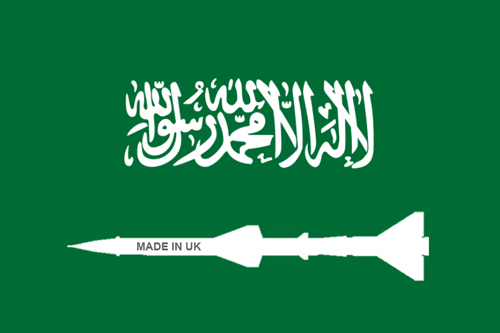
In May 2013 it was revealed that British arms deals with Saudi Arabia have reached £4bn over the last four years. In 2012 this included £112m worth of ammunition grenades for crowd control, components for military aircraft and combat vehicles, and components for electronic warfare. British ruling class figures visit the kingdom with minimal press coverage. Any visit recorded is always presented as promoting ‘human rights’. Meanwhile, Saudi residents are decapitated, flogged and raped. The Saudi ruling elite provides arms to reactionaries in Syria and Libya and exports savage repression to the working classes of Bahrain, Jordan and Yemen. Saudi Arabia’s loyalty to US and British imperialism is astounding.
Under both ConDem and Labour governments, British criticism of human rights in Saudi Arabia amounts to nothing. While Prime Ministers urge ‘reform’, their support for the Saudi regime, as a protector of British interests in the Middle East, comes first. When King Abdullah recently put 30 women in his 150-strong Shura council for the first time, Foreign Secretary William Hague cheered the move as ‘a milestone for reform of women’s rights in Saudi Arabia.’ His words are poison to the oppressed women of a country which practises segregation, execution for adultery and pardons wealthy rapist bosses and fathers.
In January Rizana Nafeek, a Sri Lankan nanny, was beheaded after a baby died in her care when she was 17. Sri Lanka had refused to pay the blood money to prevent the execution. Another 45 Indonesian maids await execution and unknown numbers from Sri Lanka, India, Ethiopia and Philippines. Foreign workers, especially women, in Saudi Arabia have minimal legal protection, are often refused lawyers. Human Rights Watch says that many of the 1.5 million foreign maids in Saudi Arabia face ‘intense exploitation and abuse, ranging from months of hard work without pay to physical violence to slavery-like conditions’. In March it was reported that a man was to be surgically paralysed unless he could pay $266,000 dollars to his victim; the regime now denies this.
Visits to Saudi palaces are regular for the British ruling class. Cameron visited twice last year. The ConDem government is quick to assure that it is ‘engaging with Saudi society and government to support our vision of human rights.’ It sent Prince Charles and Camilla to Riyadh to ensure contracts progressed smoothly. Still top of the agenda were ‘military links between the Saudi and UK Armed Forces.’ These links were revealed in 2011 when Saudi troops with British arms brutally attacked the democratic protest movement in Bahrain, propping up yet another bourgeois dictatorship. This is the ‘engagement’ that British politicians are after, as profits and control of the Middle East come first.
Obama and the Saudi Minister of Interior Prince Mohammed bin Nayef met in the White House on 14 January 2013 and ‘discussed security and regional issues of mutual interest’. In his 2010 State of the Union address, Obama set what observers said was an ambitious goal of doubling US exports from their level in 2009. But imperialism doesn’t expand without exploitation or warmongering violence. Since Obama’s speech, the value of US non-defence exports to Saudi Arabia have increased by nearly 68%, while yearly US arms sales to Saudi Arabia reached a record $66.3bn for 2011, exceeding the size of the entire Syrian economy. TheUS does more trade, mostly oil and weapons, with Saudi Arabia than any other country in the region, including Israel.
In January 2013, the month of Obama’s visit to Saudi Arabia, US government adviser Bruce Riedel wrote a memorandum for the President on the US-Saudi relationship, warning that, ‘Revolution in Riyadh, the possible overthrow of the House of Saud, would represent a severe setback to America’s position in the region and provide a dramatic strategic windfall for Iran’. A revolutionary situation in Saudi Arabia, Riedel writes, would spell danger for other US-backed monarchies such as Bahrain, which ‘could not last without Saudi money and tanks’. He also includes Jordan – a ‘weak link in the chain’, with growing resistance which ‘could threaten peace with Israel’ – as well as Qatar, Kuwait and even the supposedly stable United Arab Emirates.
The root of the problem is the crisis of capitalism and the instability it has created for imperialism’s dictatorial allies. More instability in Saudi Arabia, says Riedel, ‘would cause havoc in global oil markets, setting back economic recovery in the West’. The recommendations to the US ruling class involve more military support to the Saudi state machinery, with Britain at the forefront of propping up the Saudi regime. The real cost of the billions of dollars and pounds arms deals is being paid for by the blood of the working class people of the region.
Louis Brehony




